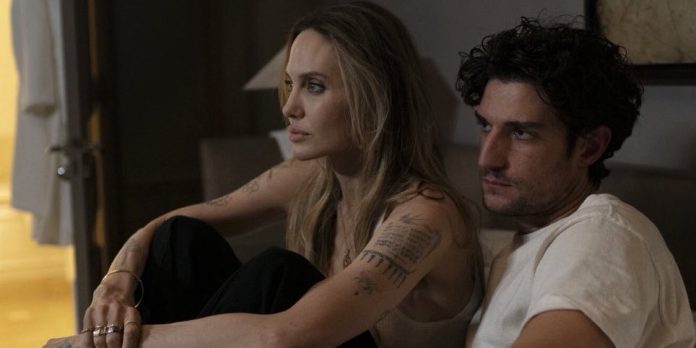THE STORY – American filmmaker Maxine arrives in Paris for Fashion Week on a life-and-death journey, facing challenges and self-discovery.
THE CAST – Angelina Jolie, Louis Garrel, Ella Rumpf, Anyier Anei & Garance Marillier
THE TEAM – Alice Winocour (Director/Writer)
THE RUNNING TIME – 106 Minutes
In the words of French novelist and modernist Marguerite Duras, you can write from anywhere. The “perfect” spot simply does not exist. All we have are a series of imperfections to sift through and find space for in the present. Duras’s cameo reverberates as a compelling footnote for Alice Winocour’s “Couture,” a layered story of artistic rage and liberation stitched into creative pursuits. As seen in the film, there is no creativity without interruption, as the trials and tribulations of life arrive without warning. The characters — women working in the film and fashion industries, faced with mounting pressures and sacrificial expectations — hang by a thread in the fabric of Winocour’s delicately interwoven narrative. While some elements of the screenplay fall short, “Couture” patches together unique observations of women in pursuit of their ambitions.
Filmmaker Maxine (Angelina Jolie) arrives in France to direct a gothic horror short for the opening show of Paris Fashion Week. When asked what fashion means to her, the words “useless” and “necessary” come to mind. She’s not used to the extravagance of this world; her creative wheelhouse is defined by low-budget, independent horror films. But there’s an edge to Maxine’s work that aligns with how rebellious fashion can be; her gothic project is about a female vampire avenging violence, ending with a shout of rage and liberation. As the audience watches this production take shape and come to life, Maxine faces life-changing news when she is diagnosed with breast cancer and must undergo a mastectomy. She then wrestles with how to tell her daughter the news, while also navigating a divorce.
The story intertwines Maxine’s perspective with those of young model/pharmaceutical student Ada (Anyier Anei) and makeup artist/writer Angèle (Ella Rumpf). Ada, an 18-year-old South Sudanese model, is discovered by an agency and offered the starring role in Maxine’s short film. Anei, making her feature film acting debut, delivers stellar work. As the fashion show opener, figuring out her path, Ada arrives in Paris with little experience, which some of the other models take advantage of. Her character builds to one of the most impactful scenes in the film: a runway sequence in pursuit of dreams. The film also excels through Angèle‘s written observations of the people she encounters, which Winocour uses as narration and underlines the significance of having a female perspective to tell the story.
At the core of “Couture” is a magnetic Angelina Jolie, who delivers one of the most vulnerable and layered performances of her career. The film marks a deeply personal story for Jolie, as both her mother and grandmother died of cancer. In 2013, Jolie herself had undergone a double mastectomy to prevent the risk of developing the disease. Her personal experience and family’s history add poignant context to the character of Maxine, not to mention strength in approaching the subject on such a sensitive level. Adding to the poignant portrayal, Winocour wisely avoids defining the character only by illness. She’s multifaceted, spirited, bold, and has a strong affinity with horror…as does Winocour, evidently.
From casting two stars of Julia Ducournau’s “Raw” — Ella Rumpf as Angèle, and Garance Marillier as the seamstress who hems Ada’s runway dress — to including a scene where Maxine shows her cinematographer (Louis Garrel) a clip from Neil Marshall’s “The Descent,” there are neat instances of genre admiration. This extends to the visual language for both Maxine’s vampiric short film and the runway itself, which utilizes a moody and foggy forest setting. The runway sequence in particular features impressive sound design, editing, and cinematography that are truly transporting.
In “Couture,” fashion is a powerful form of self-expression. It’s the promising start of a new life, and the end of an old one. It’s the frenetic backdrop for personal crises that intersect from different backgrounds. It’s the toxic industry in which women’s bodies are scrutinized and discarded. Winocour deftly gazes beyond the glamour to emphasize women’s experiences in an environment where men constantly undermine them. Maxine’s gothic perspective, for instance, is described as too bloody and vampiric. When she disappears off set to make a doctor’s appointment, her absence is consistently questioned afterwards. Maxine’s one hour of personal time is frowned upon, as though she’s incapable of doing her job fully because she missed a shot on set.
A similarly frustrating moment occurs with Angèle, whose male editor calls her writing (based on real-life encounters she’s had as a makeup artist) unrealistic and uninteresting. His unwillingness to even engage with her perspective speaks to one of the many bleak realities women face when it comes to their stories being heard. A bit of this energy is reflected in a later scene between Maxine and her doctor; he stresses that she must put work on hold to do chemotherapy, and she responds by stressing the importance of making her film. It’s not just for the money, but for creative expression.
At times, the roundabout structure of “Couture” can make for a plodding watch, and leaves some character development to be desired. But there’s a spellbinding quality to Winocour’s direction; she glides from one woman’s perspective to the next somewhat obliquely. In doing so, she unearths gems of inner conflict in characters who are withholding so much about their personal lives just to do their jobs and get through the day. It’s a deeply relatable sentiment, and a refreshing one to see depicted on screen.


